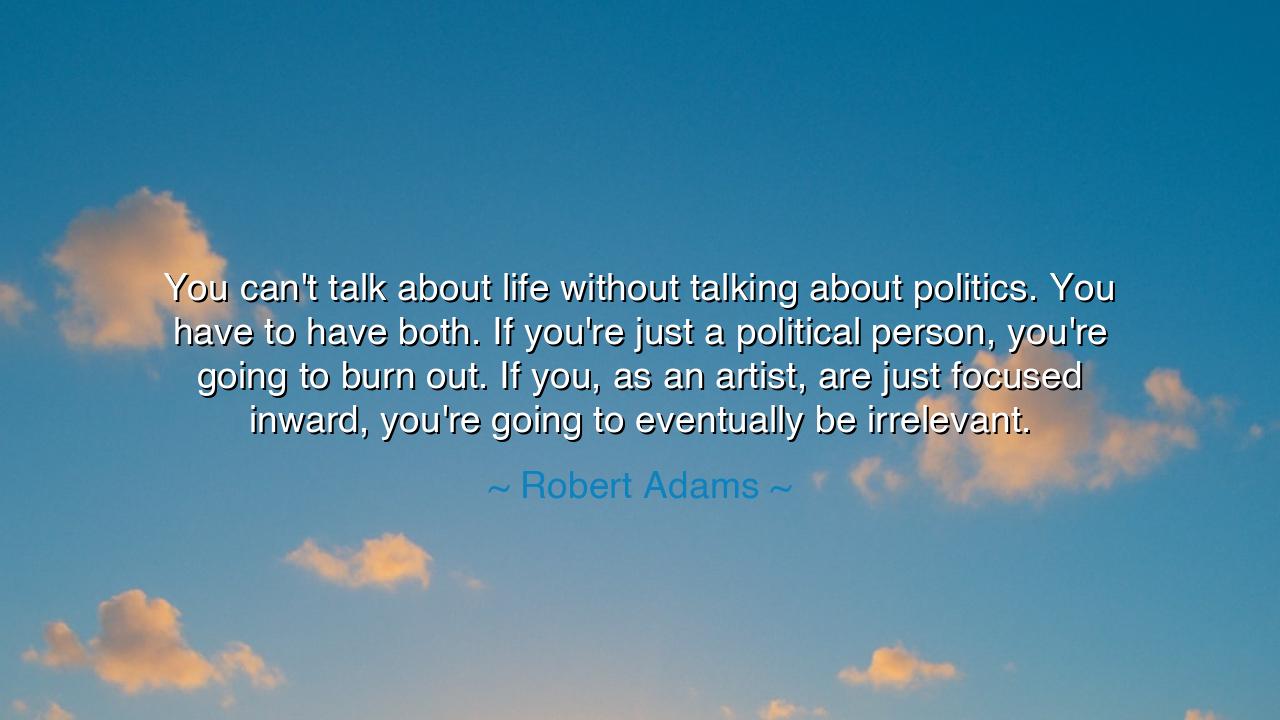
You can't talk about life without talking about politics. You
You can't talk about life without talking about politics. You have to have both. If you're just a political person, you're going to burn out. If you, as an artist, are just focused inward, you're going to eventually be irrelevant.






Life is a tapestry woven of both the inner world and the outer world, of private dreams and public struggles. When Robert Adams declared, “You can't talk about life without talking about politics. You have to have both. If you're just a political person, you're going to burn out. If you, as an artist, are just focused inward, you're going to eventually be irrelevant,” he spoke to the eternal balance that every thinker, leader, and creator must seek. His words remind us that to understand life fully, one must look both within, to the realm of the soul, and beyond, to the forces that shape society.
The first truth of Adams’s words is that politics is life externalized. Politics is not merely debates or laws—it is the struggle over how people live, how justice is given, and how power flows through a community. To speak of life without acknowledging politics is to ignore the very structures that shape human destiny. Yet, Adams warns of a grave danger: if a person becomes only political, pouring their entire being into the battles of the world, they risk burnout. The fires of activism, without renewal, consume the spirit, leaving only ashes and despair.
On the other hand, to be concerned only with the self, to live solely in art, contemplation, or personal expression, is to risk irrelevance. The artist who shuts out the struggles of the world may create beauty, but it will be beauty without connection, a flower blooming in a desert unseen by others. In times of crisis, such art may feel hollow, disconnected from the pain and hope of the people. Adams calls artists to look outward as well as inward, to let their inner visions be shaped by the realities of the world around them.
History provides a shining example of this balance in the life of Pablo Picasso. For much of his career, Picasso was absorbed in artistic exploration. But when the horrors of the Spanish Civil War unfolded, he turned his gaze outward and painted Guernica, a masterpiece that was not only art but a powerful political statement. Had Picasso focused only inward, he might have created works of technical brilliance but little resonance. By engaging with the political suffering of his time, he gave the world a symbol of resistance and remembrance.
Conversely, history is filled with political figures who burned out by carrying the weight of their battles alone. Robespierre, a leader of the French Revolution, was consumed entirely by politics, losing sight of the humanity behind his ideals. His relentless fervor ultimately destroyed both himself and the movement he sought to lead. His story is a warning of what happens when one lives outwardly without tending to the inner life.
Let this lesson echo through the ages: to live fully is to balance the soul and the world. Politics without inner reflection leads to rage and exhaustion, while art without engagement fades into silence. As Robert Adams teaches, the wisest path is to carry both—the fire of public struggle and the quiet light of private truth—so that one’s life may be both meaningful and enduring, a bridge between the individual and the greater human story.






AAdministratorAdministrator
Welcome, honored guests. Please leave a comment, we will respond soon